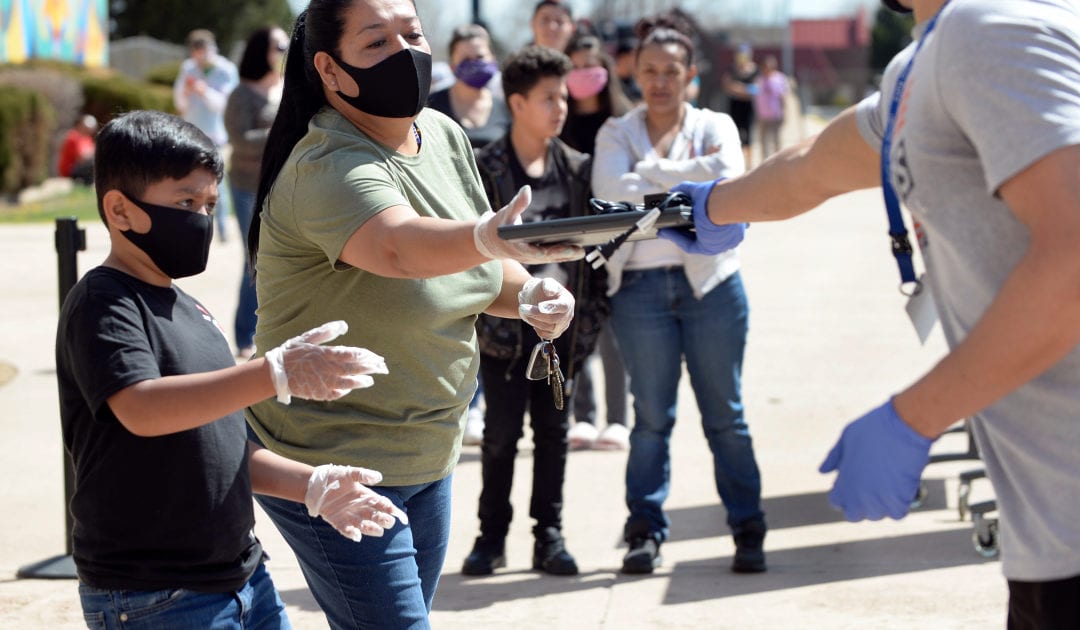
Colorado will invest $2 million in federal coronavirus relief funds in school districts trying to make sure all of their students have a reliable internet connection while learning at home.
Districts will be able to use the money to purchase hot-spots for families who live in areas where broadband service isn’t readily available or to support more creative solutions if hot-spots don’t work in their communities. That could include bringing towers and mobile trucks into districts.
Thousands of students are struggling to access their public school instruction as classes are being taught remotely in some places due to the coronavirus pandemic. A Department of Education survey conducted in partnership with the Colorado Education Initiative found that about 65,000 Colorado students lack access to the internet.
“Broadband access is now an essential school supply,” Colorado Education Commissioner Katy Anthes said during a media conference Wednesday morning. “It’s a non-negotiable.”
The investment was part of a broader announcement that Anthes made alongside Gov. Jared Polis, Attorney General Phil Weiser and Sen. Jeff Bridges at Fort Logan Northgate School in southwest Denver.
“The question before us is how we can make sure that every child has access to high quality broadband, especially during the pandemic,” Polis said.

No matter where families live in the state, Polis said, they need internet access at home. Without it, students aren’t able to participate in remote learning or complete their homework and they’re more likely to disengage and fall behind.
Polis cited several instances of broadband providers opening their service to students for remote learning since COVID-19 restrictions began. Viaero Wireless in Fort Morgan converted hundreds of inexpensive smartphones into wireless hotspots for families. Elevate Fiber, the internet service from Delta-Montrose Electric Association, connected 400 homes and upgraded everyone to 1 gigabit per second service, no matter how little they were paying.
Officials are also working with national broadband providers to provide access, or faster service, across the state.
COVID-19 IN COLORADO
The latest from the coronavirus outbreak in Colorado:
- MAP: Known cases in Colorado.
>> FULL COVERAGE
T-Mobile will provide free mobile hotspots and up to 100 gigabytes of broadband data to 34,000 low-income families. It was part of a renegotiated deal with the Colorado Attorney General’s office originally made last year to allow T-Mobile’s $26 billion merger with Sprint.
T-Mobile’s service is mostly in urban and suburban areas. The free service would be available to families with students eligible for the National School Lunch program and would help offset the cost of the internet for some families who could use the money elsewhere.
“One of the ways we can build resilience is access to broadband, giving people learning opportunities, telemedicine opportunities, giving people access even to food and other basic needs,” Weiser said. “But the reality is that a lot of people don’t have broadband. A lot of students don’t have broadband. And as our governor said, often it’s the poorest, often it’s on racial lines, which means educational disparities can be made even worse at this time.”
T-Mobile’s offer to low-income Colorado residents will be available for the next five years, according to the state AG’s office. It’s capped at 100 GB of data per year, leaving little room for streaming video or playing games online. Many broadband services, such as Comcast, cap customer data to about 10 times the amount, or 1 terabyte of data per month. More details on how the program will work is expected to be released Thursday by T-Mobile.
Additionally, Weiser has joined 38 other attorneys general to call on Congress to provide continual funding that would support a “lifeline service.” Federal funding is especially needed for families who are homeless or low income, he said. The group of attorneys general has filed a petition with the Federal Communications Commission, which has an E-Rate program to support access to broadband in schools and in homes where children are studying remotely.
Weiser said they want the FCC to act now to give states the ability to access broadband that they need.
Anthes said that CDE’s $2 million investment is the first step in helping districts and families secure an internet connection for students, noting that the next steps will be determined after looking across the entire state.
“If we can solve some of these initial problems, we’re going to have more information to solve some of the larger problems,” Anthes said.
This story was updated at 2:30 p.m. on Sept. 2, 2020, to include more details about T-Mobile’s free internet offer.
Our articles are free to read, but not free to report
Support local journalism around the state.
Become a member of The Colorado Sun today!
$5/month
$20/month
$100/month
One-time Contribution
The latest from The Sun
This content was originally published here.

